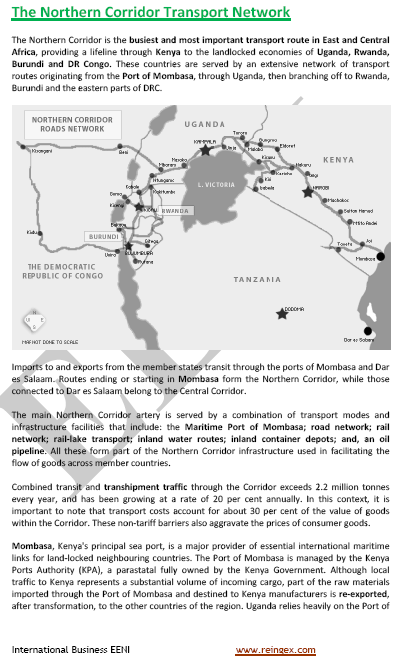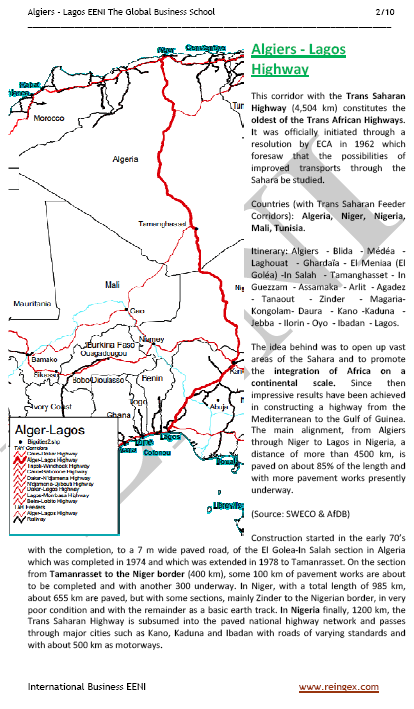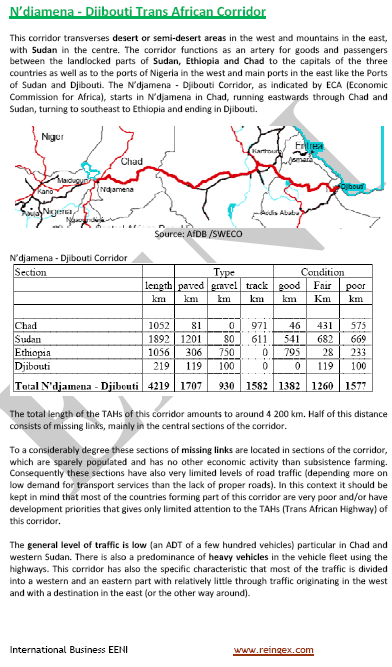African Transport Corridors, Highways
Trans-African Road Network: Cairo-Dakar, Algiers-Lagos, Tripoli-Windhoek
Fifteen African Countries are landlocked: Botswana, Burkina Faso, Burundi, Chad, the Central African Republic, Ethiopia, Lesotho, Malawi, Mali, Niger, Rwanda, Eswatini, Uganda, Zambia, and Zimbabwe.
Implications for these countries:
- High Logistics costs (up to 77%)
- Too far from the largest African and World markets
- Cannot take enough advantage of Globalization model
- Introduction to African Transport Corridors
- Almaty Programme of Action (United Nations)
- Trans-African Road Network/Trans-African Corridors
- Cairo-Dakar Logistics Corridor
- Algiers-Lagos Logistics Corridor (Trans-Saharan)
- Tripoli-Windhoek Logistics Corridor
- Cairo-Gaborone Logistics Corridor
- Trans-Sahelian Highway (Dakar-N’Djamena Corridor)
- N’Djamena-Djibouti Logistics Corridor
- Dakar-Lagos Logistics Corridor
- Lagos-Mombasa Logistics Corridor
- Beira-Lobito Logistics Corridor (Trans-African Highway 9)
- Northern Logistics Corridor
- Central Logistics Corridor
- North-South Logistics Corridor
- CEMAC Trade Corridor Project
- Eastern and Central Africa Corridors
- Lobito Logistics Corridor
- Corridors in SADC region
- Logistics Corridors in Namibia
- West and Central Africa Trucking Competitiveness
- Asia-Africa Logistics Corridor
- Benin-Niger-Burkina Faso-Ivory Coast Railway loop
Sample:

The educational aims of the Subject “African Transport Corridors” are:
- To learn about state of African Road freight transport
- To analyze the four types of African corridors (unimodal, multimodal, logistic and economic)
- To learn about the features of main transport corridors in Africa
- To know how to access to African landlocked countries through transport corridors
- To identify the causes of high costs of Road Transport in Africa
- To understand the concept of a corridor as an engine of African socio-economic development

The Subject “Trans-African Road Network” is included within the curriculum of the following academic programs at EENI Global Business School:
Road transport, Multimodal Transport.
Masters: Transport in Africa, Business in Africa.
Doctorate: Global Logistics, African Business.
 >
>
Languages:  or
or  Corridors de transport africains
Corridors de transport africains
 Africa corredores
Africa corredores  Africa corredores.
Africa corredores.
Benefits of African corridors for landlocked countries:
- Gateway for the country (import and export of goods)
- Regional economic development: Concept of Corridor as engine of the socio-economic development
- New industry and related services
- Creates employment
According to the “Regional Integration and Trade Department” of the NEPAD, there are four types of African corridors.
- Transport (only one mode)
- Multimodal (more than one mode, for example, Road and Rail transport)
- Logistics (the institutional framework has been harmonized, related high-value services)
- Economic (Furthermore, attraction of investments - public and private-, new economic activities in the corridor region)
The Trans-African Roads (economic area of African Civilization) consists of nine corridors.
| Highway | From - To | Kilometers |
| 1 | Cairo-Dakar | 8,640 |
| 2 | Algiers-Lagos | 4,500 |
| 3 | Tripoli-Windhoek | 9,610 |
| 4 | Cairo-Gaborone | 8,860 |
| 5 | Dakar-N’Djamena | 4,500 |
| 6 | N’Djamena-Djibouti | 4,220 |
| 7 | Dakar-Lagos | 4,010 |
| 8 | Lagos-Mombasa | 6,260 |
| 9 | Beira-Lobito | 3,520 |
| TOTAL | 54,120 |
These African Corridors should connect with direct routes all the African capitals, improve Road transport facilities and finally contribute to the Economic Integration of the African continent.
- 54,000 kilometers
- Near 25% of African corridors are missing links
- Estimated cost to complete the Trans-African Roads: 4.2 billion dollars
- Main promoters: the African Union, NEPAD, and all the Regional Economic Communities



(c) EENI Global Business School (1995-2025)
Top of this page









 WhatsApp
WhatsApp